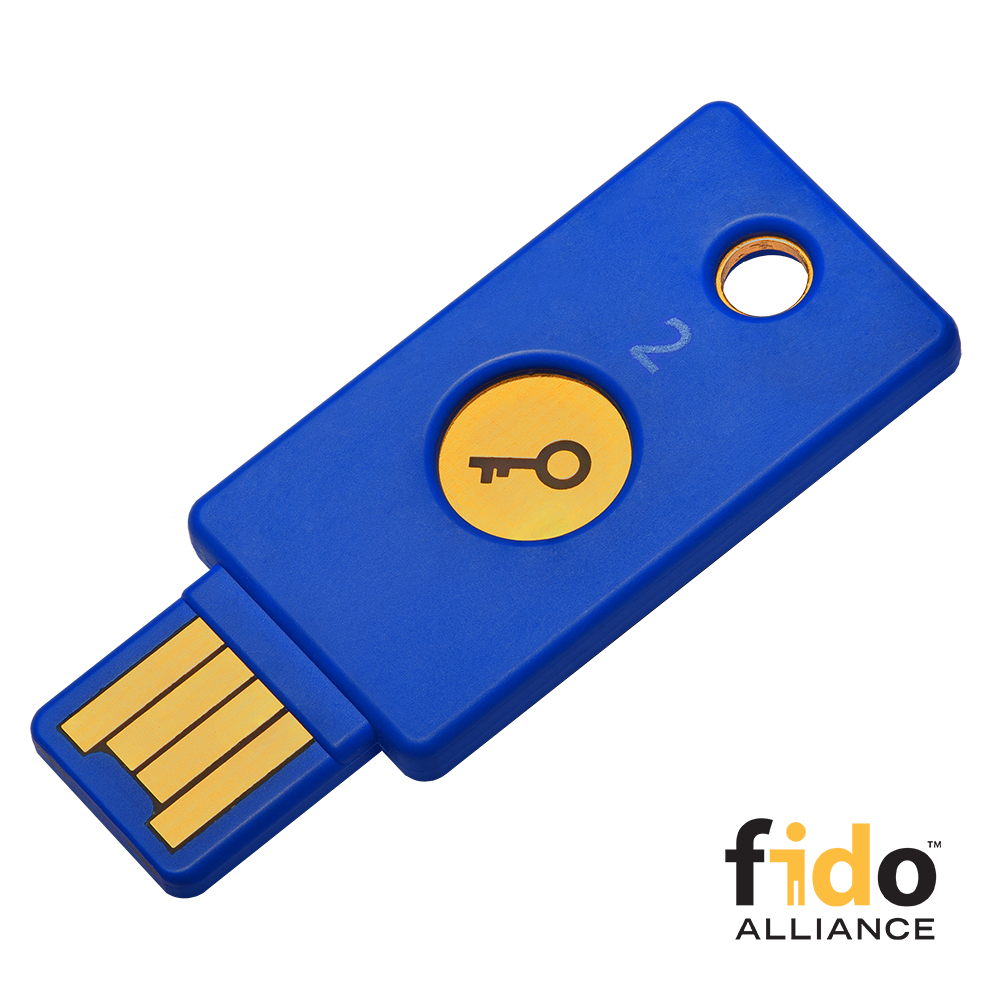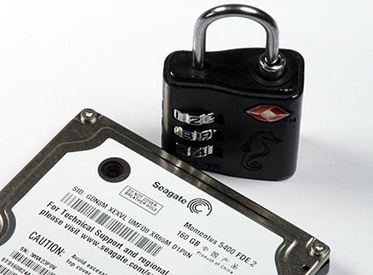What is Yubikey?
The YubiKey is a hardware authentication device manufactured by Yubico that supports one-time passwords, public-key encryption and authentication, and the Universal 2nd Factor (U2F) and FIDO2 protocols developed by the FIDO Alliance. Everyone should buy yubikey to secure application logins.
Yubikey is a physical key to open your applications / access your online services. Using yubikey, you don’t need to use username/passwords to access all of your applications, drastically reduces phishing attacks and risks from password theft.
Effective user authentication is a critical part of securing your data and infrastructure. Passwords are not enough any more, multi-factor auth is a must. This talk will dive into how FIDO U2F security keys work, why they are awesome, and how they defend against phishing attacks. SMS codes and one-time-password apps are a great improvement over passwords alone, but the FIDO Alliance’s Universal Two Factor specification attempts to take it a step further. U2F provides a phishing resistant, hardware based second authentication factor. Before you depend on a technology as a building block of security, it’s good to understand how it works, and why it’s a good fit for your needs. This talk will cover these things, so you don’t have to read the spec yourself. An overview of the two-factor landscape Why U2F is awesome How it resists phishing attacks How those security keys work inside

Buy a yubikey Hong Kong to secure your logins and make login process easily, buy yubikey Hong Kong at https://dtasiagroup.com.hk yubikey Hong Kong, we have great discount for high volume purchases.
It allows users to securely log into their accounts by emitting one-time passwords or using a FIDO-based public/private key pair generated by the device. YubiKey also allows for storing static passwords for use at sites that do not support one-time passwords. Facebook uses YubiKey for employee credentials, and Google supports it for both employees and users. Some password managers support YubiKey.Yubico also manufactures the Security Key, a device similar to the YubiKey, but focused on public-key authentication.
A single YubiKey has multiple functions for securing your login to email, online services, apps, computers, and even physical spaces. Use one or more YubiKey features, or use them all. The versatile YubiKey requires no software installation or battery; just plug it into a USB port, and touch the button, or tap-n-go for secure authentication.
Even if you are a victim of a data breach and your credentials are stolen, hackers and criminals cannot get into your account without your physical key.
Let’s take a look at the functions a YubiKey provides:
FIDO U2F
An open authentication standard enabling strong two-factor authentication to any number of web-based applications, such as Gmail, Salesforce, Twitter and hundreds more services. Works via the browser, Chrome today, and Firefox under development, and does not require any client software or drivers.
FIDO2
The latest open authentication standard enabling expanded authentication options including two-factor, multi-factor and now passwordless authentication. With YubiKey support for FIDO2, organizations can accelerate to the passwordless future without the need for any client software or drivers. FIDO2 is supported on the YubiKey 5 Series and the Security Key by Yubico.
Yubico One-Time Password (OTP)
The YubiKey generates an encrypted password for one-time use. Hackers require physical access of your YubiKey to generate the OTP. This feature is available on every YubiKey except the Security Key by Yubico.
OATH – HOTP (Event)
The YubiKey generates a six or eight character, one-time password (OTP) for logging into any service that supports OATH-HOTP, a strong open authentication standard. The action is event-based, meaning a new one-time password is generated for each event. The OATH-HOTP feature is available on every version of YubiKey except the Security Key by Yubico.
OATH – TOTP (Time)
The YubiKey generates a six or eight character, time-based one-time password (OTP) (in conjunction with a helper application) for logging into any service (such as Microsoft Cloud accounts, Google Apps, Dropbox, EverNote) that supports OATH-TOTP, a strong authentication standard. A new password is generated at a set time interval, typically every 30 seconds. The OATH-TOTP feature is available on every version of YubiKey except the Security Key by Yubico.
Challenge and Response (HMAC-SHA1, Yubico OTP)
The Challenge-Response method is best suited for offline validations. Use for Windows, Mac, and Linux computer login. The Challenge Response feature is available on every version of YubiKey except the Security Key by Yubico.
PIV-Compatible Smart Card
Smart cards contain a computer chip that brokers data exchanges. These same features are contained in the YubiKey 5 Series, based on the industry standard Personal Identity and Verification Card (PIV) interface over the CCID protocol, which supports PIV on a USB interface.
OpenPGP
In the physical world, documents and data are often validated with a signature. In the virtual world, OpenPGP is a standards-based public key cryptography for signing, encrypting, and decrypting texts, e-mails, files, etc. The YubiKey 5 Series keys can securely hold the PGP key.
Static Passwords
A basic YubiKey feature, that generates a 38-character static password compatible with any application log-in. It is most often used with legacy systems that cannot be retrofitted to enable other two-factor authentication schemes, such as pre-boot login. The static password feature is available on every version of YubiKey except the Security Key by Yubico.
The Yubikey implements the HMAC-based One-time Password Algorithm (HOTP) and the Time-based One-time Password Algorithm (TOTP), and identifies itself as a keyboard that delivers the one-time password over the USB HID protocol. The YubiKey NEO and YubiKey 4 include protocols such as OpenPGP card using 2048-bit RSA and elliptical curve cryptography (ECC) p256 and p384, Near Field Communication (NFC), and FIDO U2F. The YubiKey allows users to sign, encrypt and decrypt messages without exposing the private keys to the outside world. The 4th generation YubiKey launched on November 16, 2015. It has support for OpenPGP with 4096-bit RSA keys, and PKCS#11 support for PIV smart cards, a feature that allows for code signing of Docker images.
Buy Yubikey Hong Kong at Dtasiagroup.com.hk
Founded in 2007 by CEO Stina Ehrensvärd, Yubico is a private company with offices in Palo Alto, Seattle, and Stockholm. Yubico CTO, Jakob Ehrensvärd, is the lead author of the original strong authentication specification that became known as Universal 2nd Factor (U2F).
Yubico was founded in 2007 and began offering a Pilot Box for developers in November of that year. The original YubiKey product was shown at the annual RSA Conference in April 2008,and a more robust YubiKey II model was launched in 2009.
YubiKey II and later models have two “slots” available, for storing two distinct configurations with separate AES secrets and other settings. When authenticating the first slot is used by only briefly pressing the button on the device, while the second slot gets used when holding the button for 2 to 5 seconds.
In 2010, Yubico began offering the YubiKey OATH and YubiKey RFID models. The YubiKey OATH added the ability to generate 6- and 8-character one-time passwords using protocols from the Initiative for Open Authentication (OATH), in addition to the 32-character passwords used by Yubico’s own OTP authentication scheme. The Yubikey RFID model included the OATH capability plus also included a MIFARE Classic 1k radio-frequency identification chip, though that was a separate device within the package that could not be configured with the normal Yubico software over a USB connection.
Yubico announced the YubiKey Nano in February 2012, a miniaturized version of the standard YubiKey which was designed so it would fit almost entirely inside a USB port and only expose a small touch pad for the button. Most later models of the YubiKey have also been available in both standard and “nano” sizes.
2012 also saw the introduction of the YubiKey Neo, which improved upon the previous YubiKey RFID product by implementing near-field communication (NFC) technology and integrating it with the USB side of the device. The YubiKey Neo (and Neo-n, a “nano” version of the device) are able to transmit one-time passwords to NFC readers as part of a configurable URL contained in a NFC Data Exchange Format (NDEF) message. The Neo is also able to communicate using the CCID smart-card protocol in addition to USB HID (human interface device) keyboard emulation. The CCID mode is used for PIV smart card and OpenPGP support, while USB HID is used for the one-time password authentication schemes.
In 2014, the YubiKey Neo was updated with FIDO Universal 2nd Factor (U2F) support. Later that year, Yubico released the FIDO U2F Security Key, which specifically included U2F support but none of the other one-time password, static password, smart card, or NFC features of previous YubiKeys.At launch, it was correspondingly sold at a lower price point of just $18, compared to $25 for the YubiKey Standard ($40 for the Nano version), and $50 for the YubiKey Neo ($60 for Neo-n). Some of the pre-release devices issued by Google during FIDO/U2F development reported themselves as “Yubico WinUSB Gnubby (gnubby1)”.
In April 2015, the company launched the YubiKey Edge in both standard and nano form factors. This slotted in between the Neo and FIDO U2F products feature-wise, as it was designed to handle OTP and U2F authentication, but did not include smart card or NFC support.
The YubiKey 4 family of devices was first launched in November 2015, with USB-A models in both standard and nano sizes. The YubiKey 4 includes most features of the YubiKey Neo, including increasing the allowed OpenPGP key size to 4096 bits (vs. the previous 2048), but dropped the NFC capability of the Neo.
At CES 2017, Yubico announced an expansion of the YubiKey 4 series to support a new USB-C design. The YubiKey 4C was released on February 13, 2017. On Android OS over the USB-C connection, only the one-time password feature is supported by the Android OS and YubiKey, with other features not currently supported including Universal 2nd Factor (U2F). 4C Nano version became available in September 2017.
In April 2018, the company brought out the Security Key by Yubico, their first device to implement the new FIDO2 authentication protocols, WebAuthn (which reached W3C Candidate Recommendation status in March) and Client to Authenticator Protocol (CTAP, still under development as of May 2018). At launch, the device is only available in the “standard” form factor with a USB-A connector. Like the previous FIDO U2F Security Key, it is blue in color and uses a key icon on its button. It is distinguished by a number “2” etched into the plastic between the button and the keyring hole. It is also less expensive than the YubiKey Neo and YubiKey 4 models, costing $20 per unit at launch because it lacks the OTP and smart card features of those previous devices, though it retains FIDO U2F capability.[
ModHex
When being used for one-time passwords and stored static passwords, the YubiKey emits characters using a modified hexadecimal alphabet which is intended to be as independent of system keyboard settings as possible. This alphabet, referred to as ModHex or Modified Hexadecimal, consists of the characters “cbdefghijklnrtuv”, corresponding to the hexadecimal digits “0123456789abcdef”. Due to YubiKeys using raw keyboard scan codes in USB HID mode, there can be problems when using the devices on computers that are set up with different keyboard layouts, such as Dvorak. It is recommended to either use operating system features to temporarily switch to a standard US keyboard layout (or similar) when using one-time passwords, although YubiKey Neo and later devices can be configured with alternate scan codes to match layouts that aren’t compatible with the ModHex character set.
U2F authentication in YubiKeys and Security Keys bypasses this problem by using the alternate U2FHID protocol, which sends and receives raw binary messages instead of keyboard scan codes.CCID mode acts as a smart card reader, which does not use HID protocols at all.
You can buy one at https://dtasiagroup.com.hk yubikey Hong Kong, then register the key at yubico.com, then login your application (Google mail, Microsoft account etc..) to register the key, those service providers will create a virtual lock for your key (private, public key encryption stuffs), then voilà! besides keys to your door house and treasure boxes, now you have a very secured key to all of your precious data vaults. Now that you understand why you should buy yubikey to secure your logins, buy them at https://dtasiagroup.com.hk yubikey Hong Kong, we have great discount for high volume purchases. The below material is just for reference and SEO, you can skip it. This article is SEO material for yubikey Hong Kong, you should buy yubikey to secure your logins, buy them at https://dtasiagroup.com.hk yubikey Hong Kong, we have great discount for high volume purchases. The below material is just for reference and SEO, you can skip it.


